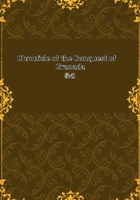
第90章
"The Catholic sovereigns," says Fray Antonio Agapida, "had by this time closely clipped the right wing of the Moorish vulture."
In other words, most of the strong fortresses along the western frontier of Granada had fallen beneath the Christian artillery. The army now lay encamped before the town of Moclin, on the frontier of Jaen, one of the most stubborn fortresses of the border. It stood on a high rocky hill, the base of which was nearly girdled by a river: a thick forest protected the back part of the town toward the mountain. Thus strongly situated, it domineered, with its frowning battlements and massive towers, all the mountain-passes into that part of the country, and was called "the shield of Granada." It had a double arrear of blood to settle with the Christians: two hundred years before, a master of Santiago and all his cavaliers had been lanced by the Moors before its gates. It had recently made terrible slaughter among the troops of the good count de Cabra in his precipitate attempt to entrap the old Moorish monarch. The pride of Ferdinand had been piqued by being obliged on that occasion to recede from his plan and abandon his concerted attack on the place; he was now prepared to take a full revenge.
El Zagal, the old warrior-king of Granada, anticipating a second attempt, had provided the place with ample ammunitions and provisions, had ordered trenches to be digged and additional bulwarks thrown up, and caused all the old men, the women, and the children to be removed to the capital.
Such was the strength of the fortress and the difficulties of its position that Ferdinand anticipated much trouble in reducing it, and made every preparation for a regular siege. In the centre of his camp were two great mounds, one of sacks of flour, the other of grain, which were called the royal granary. Three batteries of heavy ordnance were opened against the citadel and principal towers, while smaller artillery, engines for the discharge of missiles, arquebuses, and crossbows, were distributed in various places to keep up a fire into any breaches that might be made, and upon those of the garrison who should appear on the battlements.
The lombards soon made an impression on the works, demolishing a part of the wall and tumbling down several of those haughty towers which, from their height, had been impregnable before the invention of gunpowder. The Moors repaired their walls as well as they were able, and, still confiding in the strength of their situation, kept up a resolute defence, firing down from their lofty battlements and towers upon the Christian camp. For two nights and a day an incessant fire was kept up, so that there was not a moment in which the roaring of ordnance was not heard or some damage sustained by the Christians or the Moors. It was a conflict, however, more of engineers and artillerists than of gallant cavaliers; there was no sally of troops nor shock of armed men nor rush and charge of cavalry. The knights stood looking on with idle weapons, waiting until they should have an opportunity of signalizing their prowess by scaling the walls or storming the breaches. As the place, however, was assailable only in one part, there was every prospect of a long and obstinate resistance.
The engineers, as usual, discharged not merely balls of stone and iron to demolish the walls, but flaming balls of inextinguishable combustibles designed to set fire to the houses. One of these, which passed high through the air like a meteor, sending out sparks and crackling as it went, entered the window of a tower which was used as a magazine of gunpowder. The tower blew up with a tremendous explosion; the Moors who were upon its battlements were hurled into the air, and fell mangled in various parts of the town, and the houses in its vicinity were rent and overthrown as with an earthquake.